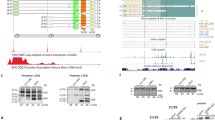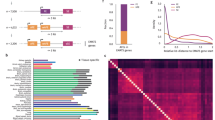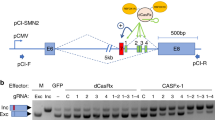Abstract
DYSTROPHIN is the protein product of the Duchenne/Becker muscular dystrophy locus. It has a relative molecular mass of 427,000 and is encoded by a large RNA transcript processed from more than 65 exons spread over two million base pairs of the human X chromosome1–5. We have used the polymerase chain reaction6 to see whether any of these exons are used alternatively in the different tissues that express dystrophin. As reported for rat dystrophin7, we find that the first exon of the human dystrophin transcript is different in brain and muscle, indicating that dystrophin expression could be differentially regulated in these tissues by usage of distinct promoters. The 3′ end of the dystrophin transcript can be alternatively spliced to create numerous isoforms differing at their carboxy 1 domains; this is the only domain of dystrophin that does not share any similarity with the related cytoskeletal α-actinins3. These alternative transcripts yield dystrophin molecules which may interact with different proteins of the tissues expressing dystrophin.
This is a preview of subscription content, access via your institution
Access options
Subscribe to this journal
Receive 51 print issues and online access
$199.00 per year
only $3.90 per issue
Buy this article
- Purchase on Springer Link
- Instant access to full article PDF
Prices may be subject to local taxes which are calculated during checkout
Similar content being viewed by others
References
Hoffman, E. P., Brown, R. H. & Kunkel, L. M. Cell 51, 919–928 (1987).
Koenig, M. et al. Cell 50, 509–517 (1987).
Koenig, M., Monaco, A. P. & Kunkel, L. M. Cell 53, 219–228 (1988).
van Ommen, G. J. B. et al. Genomics 1, 329–336 (1987).
Burmeister, M. et al. Genomics 2, 189–202 (1988).
Saiki, R. K. et al. Science 239, 487–491 (1988).
Nudel, U. et al. Nature 337, 76–78 (1989).
Hoffman, E. P., Monaco, A. P., Feener, C. C. & Kunkel, L. M. Science 238, 347–350 (1987).
Chamberlain, J. S. et al. Science 239, 1416–1418 (1988).
Hoffman, E. P., Hudecki, M. S., Rosenberg, P. A., Pollina, C. M. & Kunkel, L. M. Neuron 1, 411–420 (1988).
Chelly, J., Kaplan, J. C., Maire, P., Gautron, S. & Kahn, A. Nature 333, 858–860 (1988).
Hammond, R. G. Jr, Cell 51, 1 (1987).
Davison, M. D. & Critchley, D. R., Cell 52, 159–160 (1988).
Lemaire, C., Heilig, R. & Mandel, J. L. EMBO J. 7, 4157–4162 (1988).
Chirgwin, J. M., Przybla, A. E., MacDonald, R. J. & Rutter, W. J. Biochemistry 18, 5294 (1979).
Author information
Authors and Affiliations
Rights and permissions
About this article
Cite this article
Feener, C., Koenig, M. & Kunkel, L. Alternative splicing of human dystrophin mRNA generates isoforms at the carboxy terminus. Nature 338, 509–511 (1989). https://doi.org/10.1038/338509a0
Received:
Accepted:
Issue Date:
DOI: https://doi.org/10.1038/338509a0
This article is cited by
-
Dystrophin Dp71 and the Neuropathophysiology of Duchenne Muscular Dystrophy
Molecular Neurobiology (2020)
-
Integrative effects of dystrophin loss on metabolic function of the mdx mouse
Scientific Reports (2018)
-
Dystrophin Dp71 Isoforms Are Differentially Expressed in the Mouse Brain and Retina: Report of New Alternative Splicing and a Novel Nomenclature for Dp71 Isoforms
Molecular Neurobiology (2018)
-
DMD transcripts in CRL-2061 rhabdomyosarcoma cells show high levels of intron retention by intron-specific PCR amplification
Cancer Cell International (2017)
-
Targeted RNA-Seq profiling of splicing pattern in the DMD gene: exons are mostly constitutively spliced in human skeletal muscle
Scientific Reports (2017)
Comments
By submitting a comment you agree to abide by our Terms and Community Guidelines. If you find something abusive or that does not comply with our terms or guidelines please flag it as inappropriate.



